- Home
- Edward Rutherfurd
Paris Page 17
Paris Read online
Page 17
“I do not.”
“The wise man does not know.” He nodded. “I am a fool!” he burst out suddenly. And then, very quietly: “But I know.”
Jacob waited.
“Your daughter, Naomi, goes walking by herself quite often,” the rabbi continued.
“Yes. What of it?”
“Where does she walk?”
“It depends. Sometimes to Notre Dame, or some other church.”
“And what does she do when she gets there?”
“Lights a candle. It is the custom. What is this to you?”
“Because your daughter does not walk to Notre Dame. She walks to other places.”
“Where does she walk?”
“She can walk to Aquitaine for all I care! But she is walking with my son Aaron. That is why I am here.”
Aaron. Her childhood friend. A stocky boy, some years older than Naomi. Nothing special. Jacob hadn’t given him a thought in years.
So Naomi’s outburst had caused her to start seeing her Jewish childhood friends again. He could understand her doing so, but it was not wise, especially to be seen in the streets with the rabbi’s son. It could give rise to misinterpretation. He wondered what other Jews she might have seen, and what she might have said to them.
“I did not know this. I will tell her she should not meet him anymore.” He almost reached out his hand to touch the rabbi’s arm, but decided not to, instead giving him what he hoped was a conciliatory smile. “I am sure Aaron is a good young man. But in our situation …” He shrugged sadly. “Their old friendship is no longer wise.”
“You have not understood,” said the rabbi. “They want to get married.”
“Married?”
“Yes, Jacob ben Jacob. Married. Your daughter wants to return to the faith of her fathers. She wants to marry my son and be a Jew again.”
Jacob gazed at him. Then he bowed his head.
So. She had deceived him. Completely. For a moment it was like a blow to the pit of his stomach. He sagged forward.
She had turned away from him. She was no longer his. Did her mother know? Had his whole family secretly deserted him? He took a deep breath.
She was young. He must remember this. She might read and write, and think for herself, and show wisdom. But she was still young, and probably in love. He told himself this quickly, before the pain grew too great to bear.
“You are sure of this?” he asked, without looking up.
“Yes. My son has spoken to me.”
“Such a thing is impossible.”
“Of course it is impossible.”
“Does she not realize that this would put her whole family in danger? My own conversion would be questioned.”
“Your family?” The rabbi leaned forward, and began to speak, in a low voice that was intense with anger. “Less than thirty years ago, Jacob ben Jacob, a Christian in Brittany converted to Judaism. Such a thing is very rare. We do not encourage it. But it happens. And when that convert died, he was buried as a Jew, in the Jewish cemetery. And do you know what the Inquisition did? They burned the rabbi at the stake. Because he let that man die a Jew, when he should have been buried in Christian, consecrated ground. Does this make sense? Not to me. But that is what they did.” He paused. “So what will happen to me and my family if the Inquisition says that we are stealing a Christian convert back to Judaism? Who can tell? But for taking your daughter’s soul into our evil clutches, they will probably burn me and my son as well. Our risk is not less than yours, Jacob. It is greater.”
“What have you told your son?”
“That I forbid him even to think of it.”
“And what does he say?”
“That he will marry no one else. I told him: ‘Then you will marry no one.’ ” The rabbi threw up his hands. “He thinks that they can go to live in another city where they are not known. Arrive there as a married couple. This is foolishness. I have told him no. But … I don’t know what they may do.”
“You don’t think …?”
“That there is a child on the way? No. Thank God. He says they have not … But we had better be careful. You must lock your daughter up, Jacob, to stop this madness.”
“It is what I will do,” he said.
He tried to reason with her first.
“My child, do you think I do not understand?” he cried. “When you are in love, the skies open, you think you see angels. Everything seems possible. But there are darker forces at work in the world, and I am trying to protect you from them.”
She listened to him. But when he asked her to promise never to see the young man again, she would not do it. And even if she had, he wasn’t sure he would have believed her.
From that day, despite all her protests, Naomi was kept in the house. She could not even take her little brother for a walk. Jacob told her that she could come out with him, if she wished. But she refused, because she would not speak to him.
Though he was under close watch himself, Aaron tried to see her, and three times tried to sneak a letter in to her. But Jacob and the rabbi managed to prevent all these attempts from succeeding.
In the home, the atmosphere was tense. Jacob was not sure how long the family could continue to live like this.
“I have men with whom I do business in other cities,” he suggested to Sarah. “Perhaps she could go and live with another family for a while.”
“And what might she do then? Will you have them keep her under lock and key?”
There seemed no solution to the problem. A month passed. In the Jewish calendar, they came to the fast day of Tisha B’Av.
King Philip the Fair was both ruthless and efficient. He’d shown it in getting a pope of his own. Now, on the twenty-second day of July, in the year of Our Lord 1306, which was the day following the Jewish fast of Tisha B’Av, he showed it again.
The preparations had been immaculate. No word of his intentions had leaked out. Renard the merchant had heard nothing. Every street, every house was known. The cordons were ready and moved into place during the night. And at dawn, his men struck.
The success was total. Every Jew in Paris was arrested. They, their wives, their children. Not a one was missed. By early morning they had been marched through the streets to the awaiting jails. There they were given the news.
They were to leave France at once. They might take with them the clothes on their backs and the paltry sum of twelve sous. Everything else was forfeit, to the king.
In the middle of the morning, Jacob met Renard in the street. They looked at each other.
“It came after all, then,” said Renard quietly.
“Yes.” There was no need to say more.
By mid-afternoon, much was known. The same thing had happened in every town in France where there was a Jewish community. They were to leave every territory that King Philip controlled. The usual reasons were given for the arrests—the Jews’ religion, their practice of usury—but nobody was fooled for an instant. Jacob was in a group of merchants whom a royal councillor addressed in the market of Les Halles.
“None of the debt owed to the Jews is to be forgiven,” the man explained. “Those debts are now the property of the king, and he will insist on their being honored to the full.” This was not popular. But the next piece of news brought groans. “Further, all debts must be repaid in the coinage in use at the time they were contracted. The king will insist upon it.”
This was devious. King Philip had just issued large quantities of clipped coinage. Clearly, he had no desire to be paid in his own debased currency.
The expulsion of the Jews from France was simple and straightforward. It was a confiscation of the entire assets of the financial community in order to pay the king’s debts.
It took a couple of months to complete. The last Jews of Paris didn’t leave until early October. During this time, Naomi was kept indoors, and Aaron was kept on a tight leash by the rabbi. At the start of September, Jacob heard that the rabbi and his family had gone.
/> For Jacob, the great expulsion brought horror. Horror at what was being done to his people.
True, he also felt vindicated. He could turn to Sarah and say: “This is why I converted. This is what I feared.” The pain he had put his family through had not been in vain. He had indeed saved them.
But at what price in guilt? Every day, as more Jews left Paris, people would watch them go. But not Jacob. He kept away. He didn’t want to see. Above all, he feared that they might look at him. For he couldn’t have met their eyes.
And then, God forgive him, it also brought relief. Relief that the rabbi’s son was leaving.
Where were the Jews of France going? Over the eastern border into Lorraine; or into Burgundy, or farther south. Or they might journey toward Italy, up into the alpine territory of Savoy. But wherever they went, young Aaron and his family were gone. That danger, at least, was past. Life could begin anew.
Or could it? The first few days were difficult. Naomi wanted to follow Aaron. She said so plainly. And though he sympathized, Jacob could not help feeling a little aggrieved.
“She knows the danger for her family,” he protested to Sarah.
“She thinks it could be avoided. Aaron would be out of France. She thinks we could say she’d been sent to live with some merchant in another city.”
“These things get discovered. The risks are too great. She should know this.”
“She thinks it because she wants it to be true.”
“What would they live off anyway? Aaron has no money now,” Jacob pointed out sadly. “The king’s completely ruined them.”
“He’ll be a rabbi. They always manage to live.”
“Well, she can’t follow him, anyway,” said Jacob, “because she doesn’t know where he’s gone.” And this was true.
But by winter, Jacob knew. He’d taken trouble to find out.
Aaron was far away, up in the mountains of Savoy.
If Naomi had been angry at first, after a time her temper subsided into moodiness. She was allowed once again to take little Jacob for walks, which she did listlessly. Often Jacob would come upon her sitting with her brother by the fire, but while the boy chattered, she would be staring off into space.
Jacob and Sarah both suspected that Naomi might be hoping to receive some word from Aaron, and they watched carefully to intercept any such message. But as far as they could tell, no message arrived.
December came and went. There was ice in the streets. Snow fell. And in those dark days of the year, their daughter seemed to be wrapped in a mantle of sadness.
They tried to behave as normal. They did their best to be quietly cheerful in her presence. Jacob told stories in the evening, as they all sat together, and she seemed to enjoy them. If he recounted some foolish joke he’d heard in the market, she would laugh quite easily. But as gray January began, he could see little joy in her face, but only resignation.
One day, returning home from some business, he saw her sitting on a bench by the fire. She was alone. She must have heard him come in, but she did not turn, as though silently letting him know that she wanted to be left alone. And he was about to go into his counting house, but then, thinking better of it, he quietly entered and sat on the bench beside her. He did not say anything, but observed the sad curve of her neck and the way she stared with stony eyes at the embers of the fire. And after a time he put his arm around her tense shoulders and said: “I am so sorry, my child.”
She said nothing. But she did not draw away.
“I know you are unhappy,” he continued quietly. “I am sorry that you wanted to leave us, but I understand.”
After a pause, she answered.
“The truth is, Father, that I no longer wish to live in a land where they do such things.”
“Ah.” He sighed. “Aaron’s father once told me, ‘You will never be safe.’ He may have been right. Whoever is born a Jew is never safe, no matter where he goes.”
“Why are we Christian, Father?” she asked.
And then, because it seemed to him at that moment to be the right thing to do, he quietly told her everything. He told her about Renard’s warning, and his agony over what to do, and how he had feared for Sarah, the unborn baby, and herself; how he had converted, and the agony it had brought him. He told her everything.
“I may have been wrong, my child, but that is what I did and why. And now I have caused you great pain, which was never my intention, and I am sorry for it.”
When he had finished, she was very still, and he wondered if he had made her angry.
“I did not know,” she said at last.
“There was so much danger, I did not dare to tell you. I wondered sometimes if your mother had.”
“No.” She shook her head. “Nothing.”
He had removed his arm from her shoulder while he spoke. Now he put his two hands together in his lap, and stared into the fire himself.
Then he felt her put her arm around his neck and as he turned toward her, she rested her head against his shoulder.
“I understand, Father, that you did what you thought you must.”
“I hope you do,” he replied.
“You know that I shall always love you, don’t you?” she said.
He turned to look at her, and she smiled.
“Always,” she said. “You are the best father in the world. Didn’t you know?”
He could not answer, but he took her hand and squeezed it, and her words meant more to him, almost, than even the birth of his son.
From that day, she seemed to be less sad. Life began to return to its usual pattern. As spring began, Jacob asked Sarah if she thought they might begin to think about a husband for her again.
“Wait a little,” she advised.
“I leave it in your hands,” he wisely said.
At the end of May, Sarah told him, “I think she is ready.” And a few days later, Naomi herself remarked to him quite casually: “I am in no hurry to marry, Father, but when the time comes, I wonder if we should consider the Renard boy. I trust him and he has always been my friend.”
Jacob needed no further bidding. The very next day, seeing Renard walking along the street, he fell into step beside him. After a few pleasantries he remarked what a fine young fellow Renard’s eldest son had become.
“I’m pleased with the way that Naomi’s turning out as well,” he added.
They walked on a few more paces before Renard turned to look at him.
The two men showed their ages in very different ways. What little hair was left on Jacob’s head was gray. Renard by contrast, like many redheads, had kept all his hair, and showed little sign of aging at all. Only the deep, long lines that ran down his face like gullies betrayed his years.
“She is a beautiful girl,” he remarked. “I should think you’ll be looking for a husband for her soon.”
“Yes,” said Jacob.
“I remember so well,” Renard continued quietly, “those days when you converted.”
“I owe it all to you.”
“Naomi would have been about nine at that time.”
“Indeed.”
“How did she take it, then—and later?”
“Well …” Jacob hadn’t expected this question. “She is an obedient girl, so she did not question her father’s judgment. And it’s been so long now. All her friends are Christian. Her brother, of course, has been a Christian since birth.” It wasn’t quite an honest answer, but it was the best that he could make.
Renard nodded thoughtfully.
“You know my affection for you and your family, Jacob. I am glad of what I did to help you, and I would do it all again. But a marriage goes beyond that. My son loves your daughter as a friend. He will be her friend all his life. But he is also devout. Not all Christians are devout, God knows. But he is. Whoever marries my son will need to be devout. She cannot harbor any doubts.”
“Of course my daughter has no doubts,” Jacob said quickly. “None at all.”
They both kne
w it was a lie, but that he had to say it.
“We must speak of this again sometime,” the red-haired merchant suggested as he left him. But they both knew that they never would.
“I never thought he was so devout,” remarked Naomi, when her father told her about the conversation.
“Perhaps he isn’t,” said Jacob quietly.
But he was not discouraged. By the end of the summer he had begun serious negotiations with the merchants who had expressed interest before, and two other new candidates also came forward. By the end of September, he was able to present his daughter with as good a set of choices as any girl could reasonably hope for. For her part, Naomi gradually entered into the spirit of the thing. Indeed, by the time he showed her the final list, she’d become quite cheerful, and appeared to find the process amusing.
“I’d like to have a little time now, Father. Two of the choices I hardly know yet. Could I have a month or two?”
“Of course,” he answered with a smile. “Let us decide by Christmas.”
On Tuesday, the eleventh of October, Jacob was down in the Grève market on the riverbank when he happened to see Renard. The two men chatted for a little while. And Renard was just departing when he casually remarked: “Do you remember Aaron, the rabbi’s son?”
“Certainly,” Jacob replied.
“Do you know, I could have sworn I saw him in the street yesterday. I don’t suppose it was him. But if he has sneaked back into Paris, he’d better be careful. He could get arrested.”
Jacob stared at him in horror, but quickly recovered himself.
“I should think it’s unlikely,” he said, with a shake of the head. “He’d be a fool if he did come back.”
But the moment Renard was out of sight, he hurried out of the market at once.
“Where is Naomi?” he cried, as he burst into the house. Sarah told him she’d just returned from a walk with her little brother. “She’s here?” he demanded.
“She went out again. She’s gone to that stall she likes in the rue Saint-Honoré, to buy some ribbon,” her mother replied. “I’m sure she’ll be back soon.”

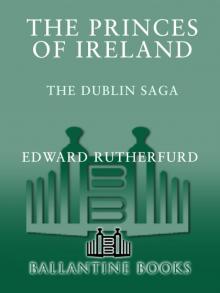 Princes of Ireland
Princes of Ireland New York
New York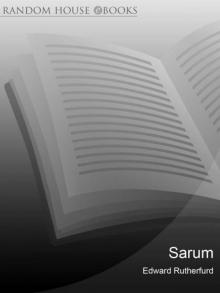 Sarum
Sarum London
London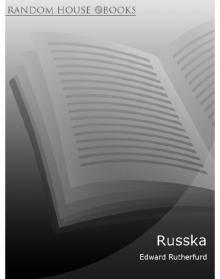 Russka: The Novel of Russia
Russka: The Novel of Russia China
China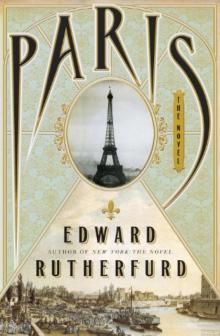 Paris
Paris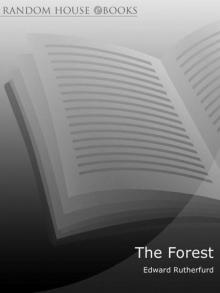 The Forest
The Forest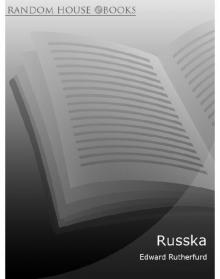 Russka
Russka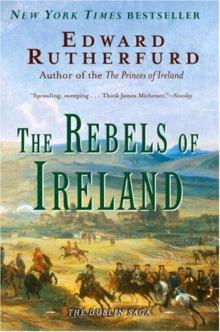 The Rebels of Ireland: The Dublin Saga
The Rebels of Ireland: The Dublin Saga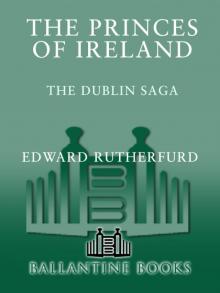 The Princes of Ireland
The Princes of Ireland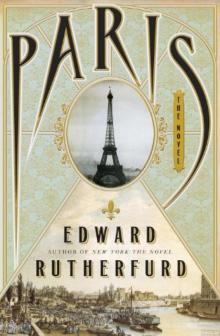 Paris: The Novel
Paris: The Novel